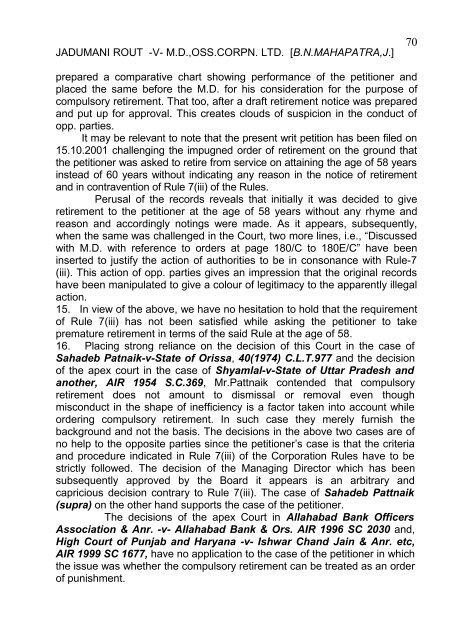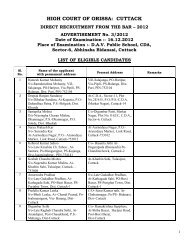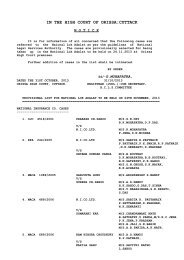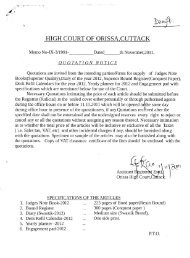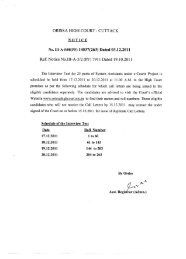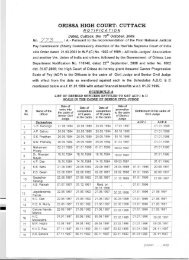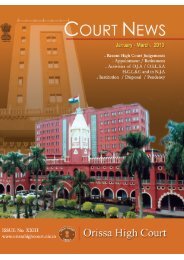ORIGINAL JURISDICTION - Orissa High Court
ORIGINAL JURISDICTION - Orissa High Court
ORIGINAL JURISDICTION - Orissa High Court
Create successful ePaper yourself
Turn your PDF publications into a flip-book with our unique Google optimized e-Paper software.
JADUMANI ROUT -V- M.D.,OSS.CORPN. LTD. [B.N.MAHAPATRA,J.]<br />
prepared a comparative chart showing performance of the petitioner and<br />
placed the same before the M.D. for his consideration for the purpose of<br />
compulsory retirement. That too, after a draft retirement notice was prepared<br />
and put up for approval. This creates clouds of suspicion in the conduct of<br />
opp. parties.<br />
It may be relevant to note that the present writ petition has been filed on<br />
15.10.2001 challenging the impugned order of retirement on the ground that<br />
the petitioner was asked to retire from service on attaining the age of 58 years<br />
instead of 60 years without indicating any reason in the notice of retirement<br />
and in contravention of Rule 7(iii) of the Rules.<br />
Perusal of the records reveals that initially it was decided to give<br />
retirement to the petitioner at the age of 58 years without any rhyme and<br />
reason and accordingly notings were made. As it appears, subsequently,<br />
when the same was challenged in the <strong>Court</strong>, two more lines, i.e., “Discussed<br />
with M.D. with reference to orders at page 180/C to 180E/C” have been<br />
inserted to justify the action of authorities to be in consonance with Rule-7<br />
(iii). This action of opp. parties gives an impression that the original records<br />
have been manipulated to give a colour of legitimacy to the apparently illegal<br />
action.<br />
15. In view of the above, we have no hesitation to hold that the requirement<br />
of Rule 7(iii) has not been satisfied while asking the petitioner to take<br />
premature retirement in terms of the said Rule at the age of 58.<br />
16. Placing strong reliance on the decision of this <strong>Court</strong> in the case of<br />
Sahadeb Patnaik-v-State of <strong>Orissa</strong>, 40(1974) C.L.T.977 and the decision<br />
of the apex court in the case of Shyamlal-v-State of Uttar Pradesh and<br />
another, AIR 1954 S.C.369, Mr.Pattnaik contended that compulsory<br />
retirement does not amount to dismissal or removal even though<br />
misconduct in the shape of inefficiency is a factor taken into account while<br />
ordering compulsory retirement. In such case they merely furnish the<br />
background and not the basis. The decisions in the above two cases are of<br />
no help to the opposite parties since the petitioner’s case is that the criteria<br />
and procedure indicated in Rule 7(iii) of the Corporation Rules have to be<br />
strictly followed. The decision of the Managing Director which has been<br />
subsequently approved by the Board it appears is an arbitrary and<br />
capricious decision contrary to Rule 7(iii). The case of Sahadeb Pattnaik<br />
(supra) on the other hand supports the case of the petitioner.<br />
The decisions of the apex <strong>Court</strong> in Allahabad Bank Officers<br />
Association & Anr. -v- Allahabad Bank & Ors. AIR 1996 SC 2030 and,<br />
<strong>High</strong> <strong>Court</strong> of Punjab and Haryana -v- Ishwar Chand Jain & Anr. etc,<br />
AIR 1999 SC 1677, have no application to the case of the petitioner in which<br />
the issue was whether the compulsory retirement can be treated as an order<br />
of punishment.<br />
70


